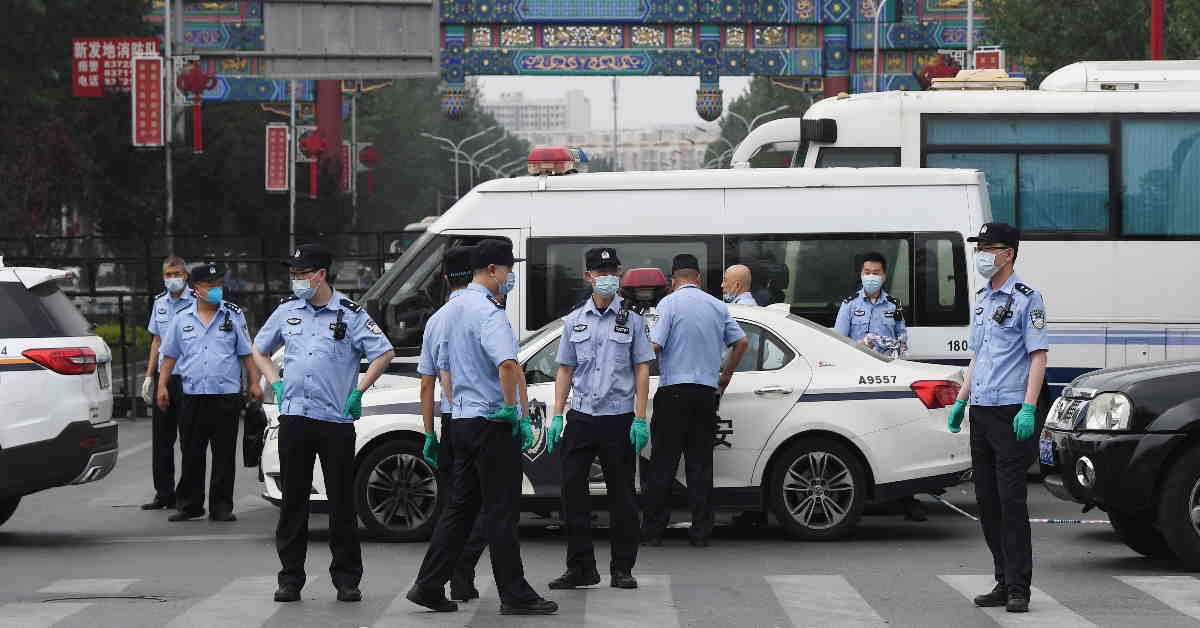Dozens of people tested positive for the coronavirus in Beijing as parts of the city were locked down Saturday after the emergence of a new cluster linked to a wholesale food market.
People were ordered to stay home at 11 residential estates in south Beijing's Fengtai district and the nearby Xinfadi market was closed as authorities raced to contain the outbreak that has fuelled fears of a resurgence in local transmission.
Most of the six new domestic infections reported Saturday were linked to the meat and vegetable market, health officials said, which provides much of the capital's food supply.
Official news agency Xinhua reported at least one of the cases was "severe".
But another 45 asymptomatic cases – which China counts separately – were detected after mass testing of nearly 2,000 workers at the market on Friday, city health official Pang Xinghuo later told reporters.
Another worker tested positive at a farmers' market in the city's north western district of Haidian – a close contact of one of the confirmed cases linked to Xinfadi.
Beijing's first COVID-19 case in two months, announced Thursday, had visited Xinfadi market and had no recent travel history outside the city.
China's domestic outbreak had been brought largely under control through strict lockdowns that were imposed after the disease was first detected late last year.
These measures had mostly been lifted as the infection rate dropped, and the majority of recent cases were citizens living abroad who were tested as they returned home during the pandemic.
Among the six new domestic cases announced Saturday were three Xinfadi market workers, one market visitor and two employees at the China Meat Research Centre, seven kilometres away. One of the employees had visited the market last week.
Authorities closed the market, along with another seafood market visited by one of the patients, for disinfection and sample collection on Friday.
Reporters saw hundreds of police officers, many wearing masks and gloves, and dozens of paramilitary police deployed at the two markets, with no one allowed to leave Xinfadi.
An ambulance was seen driving in on Saturday afternoon.
'It's Real'
Officials in Fengtai – which has more than two million residents – announced Saturday that the district has established a "wartime mechanism" to deal with the fresh wave.
Police cars were patrolling the streets outside blocked-off neighbourhoods and reporters saw one bus carrying workers in hazmat suits.
"Everyone's very stressed right now," an elderly driver said outside a fenced-off neighbourhood, refusing to give his name because of the heavy police presence.
"There are cases living in there, it's real."
With many shops in the affected areas closed, residents worried how they would stock up on essentials.
"What do you want us to eat and drink?" a woman surnamed Wang said.
"I hope we can get sufficient supplies as soon as possible".
Nine nearby schools and kindergartens have been closed. On Friday, Beijing delayed the return of students to primary schools across the city, and suspended all sporting events and group dining.
Cross-provincial tour groups have also been stopped.
Mass Testing
The chairman of the Xinfadi market told state-run Beijing News that the virus was detected on chopping boards used to handle imported salmon, stoking fears over the hygiene of the city's food supply.
Beijing's market supervision authorities ordered a city-wide food safety inspection focusing on fresh and frozen meat, poultry and fish in supermarkets, warehouses and catering services.
In central Chaoyang district, officials said they would carry out screenings at all wet markets.
Major supermarket chains including Carrefour removed all stocks of salmon overnight in the capital, but said supplies of other products would not be affected, Beijing Daily reported Saturday.
Community volunteers – who became a common sight during the outbreak – were knocking on residents’ doors to ask if they had recently visited Xinfadi market.
Beijing authorities also announced a mass COVID-19 testing campaign of anyone who has had "close contact" with Xinfadi since 30 May, after they tested more than 5,000 environmental samples from farmers' markets and large supermarkets across the city on Friday. Of those, all 40 positive samples came from Xinfadi market.
Around 10,000 people working at the Xinfadi market will be tested, the market chairman told local media. - AFP
